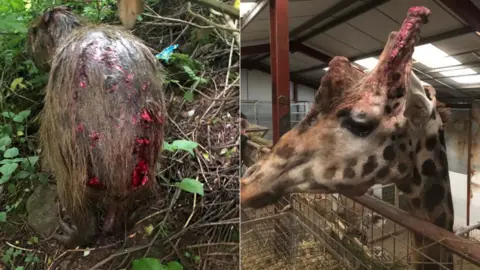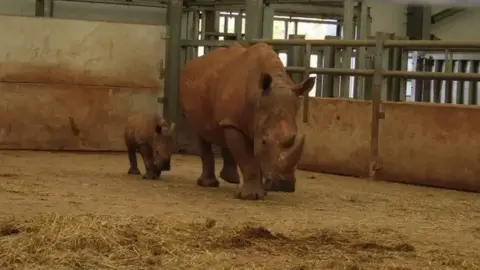Council urged to take action over troubled zoo
 PA Media
PA MediaVets, campaigners and actors have urged a council to take "immediate and decisive" action at a zoo in concerns over animal welfare issues.
In October, a BBC investigation heard allegations of avoidable animal deaths, welfare issues and a bullying culture at South Lakes Safari Zoo in Cumbria, which the zoo denies.
Westmorland and Furness Council said it was required to make sure the zoo complied with the terms of its licence but did not have the legal power to remove it.
Zoo bosses replied that the actions of Freedom for Animals were "driven by a hard line anti-captivity agenda", adding that animal welfare was always its "top priority".
Warning: This article contains images of injuries to animals some readers may find distressing.
Former zoo employees showed the BBC photos and videos which they say depict injuries and fatalities to animals, in a report released last month.
CZCL said it "wholly denied and disputed" it had ever engaged in any practices which had led to the "death, injury or poor treatment of animals".
The BBC also heard allegations of a bullying culture which involved staff being "completely broken" and "in tears". CZCL denied these claims.

An unannounced inspection in March this year by Westmorland and Furness Council expressed a belief rhinos had been kept indoors for more than 17 hours straight.
A further inspection in April raised "grave concerns" and found standards had dropped over the previous three years.
But by June, the council conducted a follow-up visit and reported 26 of 28 improvement directions were being complied with.
 BORN FREE
BORN FREEOn Monday, 33 animal protection groups, vets, scholars and public figures, including actors Peter Egan and Carol Royale, wrote to the council demanding it permanently revoked the zoo's licence.
In a letter led by charity Freedom for Animals, the council was called on to take "immediate and decisive" action.
It asked the authority to facilitate the removal of all animals held captive to appropriate and accredited sanctuaries.
Westmorland and Furness Council said the law was changed in 2003 to remove local authorities' ability to suspend or revoke zoo licences, with new powers to impose more stringent conditions introduced instead.
Councils still had the power to close zoos, but only if they failed to make the required changes or if "the situation was so bad that a zoo was deemed to be disorderly or an operator had been convicted of a criminal offence", a spokesperson said.
The authority was still monitoring and inspecting the zoo and some conditions had been applied, but "there was no evidence of the serious systemic animal health and welfare problems that characterised the collection in the past’", they added.
'Anti-captivity agenda'
Zoo boss Karen Brewer said it "continued to operate the zoo in compliance with all regulatory requirements".
She said the actions of Freedom for Animals were "driven by a hard line anti-captivity agenda".
"We have had three council inspections in the last 12 months, during which our 'excellent veterinary programme' has been noted and we have continued making improvements to satisfy the conditions of our zoo licence," Ms Brewer added.
Follow BBC Cumbria on X, Facebook, Nextdoor and Instagram. Send your story ideas to [email protected].
